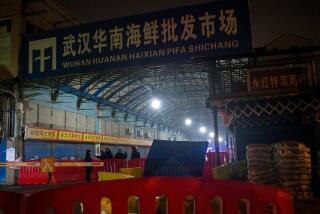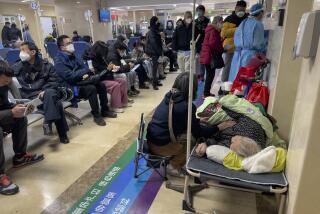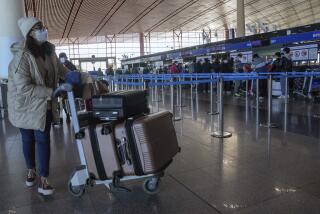Chilling Reminder of the Ease of Disease’s Spread
- Share via
SHANGHAI — After having just two confirmed SARS cases for weeks, China’s largest city has reported a jump in recent days, sparking fears that keeping this bustling metropolis out of harm’s way may not be as easy as hoped.
Shanghai officials said Wednesday that the four new cases of severe acute respiratory syndrome involve two sets of couples who traveled to Shanghai from infected areas in the North. Even though the numbers remain small, that the couples were able to slip into this city of 16 million, shop and sightsee for days without seeking medical attention are reminders of the difficulty in enforcing voluntary quarantines.
“You can see from these new cases that our preventive control mechanism is insufficient,” said Peng Jin, deputy head of Shanghai’s health bureau. “As long as the disease is not contained in other parts of the country, the possibility that Shanghai would receive more imported cases is very strong.”
Beijing, the hardest-hit city in the world, continued to report a steep climb in cases Wednesday, with an additional 97 confirmed cases and three dead. The national toll stood at 219 dead and 4,560 infected.
Authorities believe the outbreak, which has sickened about 7,300 around the world and killed about 500, might start to ease in the Chinese capital in the next week or so. Chinese Premier Wen Jiabao warned Wednesday that the situation remains grave and that the biggest worry is preventing the virus from spreading to the countryside, where the majority of China’s 1.3 billion people live with minimal health care.
Shanghai is China’s wealthiest and most international city. Keeping it relatively SARS-free is considered psychologically important in the fight against the virus, which first appeared in November in southern China’s Guangdong province.
Despite Shanghai’s low count -- six confirmed and 12 suspected cases -- the city has not escaped the outbreak’s economic impact, particularly in tourism, travel and retail. Large gatherings such as conventions, tour groups and wedding banquets have all but dried up. Despite the pleasant spring weather, outdoor crowds are thin and more people are now donning surgical masks, following the examples of people in other infected cities.
To better protect its residents, Shanghai authorities have ordered all travelers returning from such hard-hit regions as Beijing, Shanxi, Inner Mongolia and Guangdong to report to authorities and be isolated. Some neighborhoods broadcast emergency requirements over loudspeakers or have people go door-to-door inquiring about recent travels.
“A lot of people don’t want to tell us where they’ve been and who they’ve seen,” said Peng. “This has made our work very frustrating.”
The Chinese have grown unaccustomed to this kind of invasion of privacy, which is more reminiscent of the Maoist era. Increased personal freedom is one of the byproducts of the last two decades of rapid economic change. Until they feel a real threat to their lives, most people tend to ignore government pleas.
The Liberation Daily, a leading party newspaper in Shanghai, reported Wednesday that all 75 members of a tour group that returned from Beijing late last month had defied orders to report their journey to the local authorities. To avoid detection, some hid in the homes of relatives in the nearby countryside. Others returned to their normal lives, bragging to neighbors about returning from an epidemic zone unharmed.
This triggered a mad 12-hour manhunt across Shanghai and its rural suburbs. None of the tourists was found to be sick with SARS.
The stories of the four new SARS patients are less reassuring. According to official accounts, the first couple took a train from Beijing to Jiangsu province near Shanghai on April 15. They visited several popular scenic spots in the area before arriving in Shanghai on April 24. By May 2, the husband was a confirmed SARS patient; the next day, his wife was as well.
The second couple and their two children drove from an unspecified northern city to Shanghai on April 25, after also stopping in nearby Jiangsu province. When they had their temperatures checked at the border, as is common now, they passed. That afternoon, the husband developed a fever. He stayed home and took cold medicine for a few days before going to a hospital. By Sunday, he and his wife had been confirmed to have SARS. Their children are fine.
The couples did not immediately cooperate with authorities when they showed early symptoms. Health workers had to ask repeatedly before finding out that they had come from an infected region and might have had contact with other SARS patients.
City officials said this cost medical workers valuable time in identifying the more than 275 people the couples had been in contact with, including those in supermarkets, subways, department stores and medical clinics.
“It turned out one of the couples had lived in a building that had been infected,” said Peng. “So they had actually traveled to Shanghai to escape. But it’s very hard to get people to tell us the truth.”
More to Read
Sign up for Essential California
The most important California stories and recommendations in your inbox every morning.
You may occasionally receive promotional content from the Los Angeles Times.










